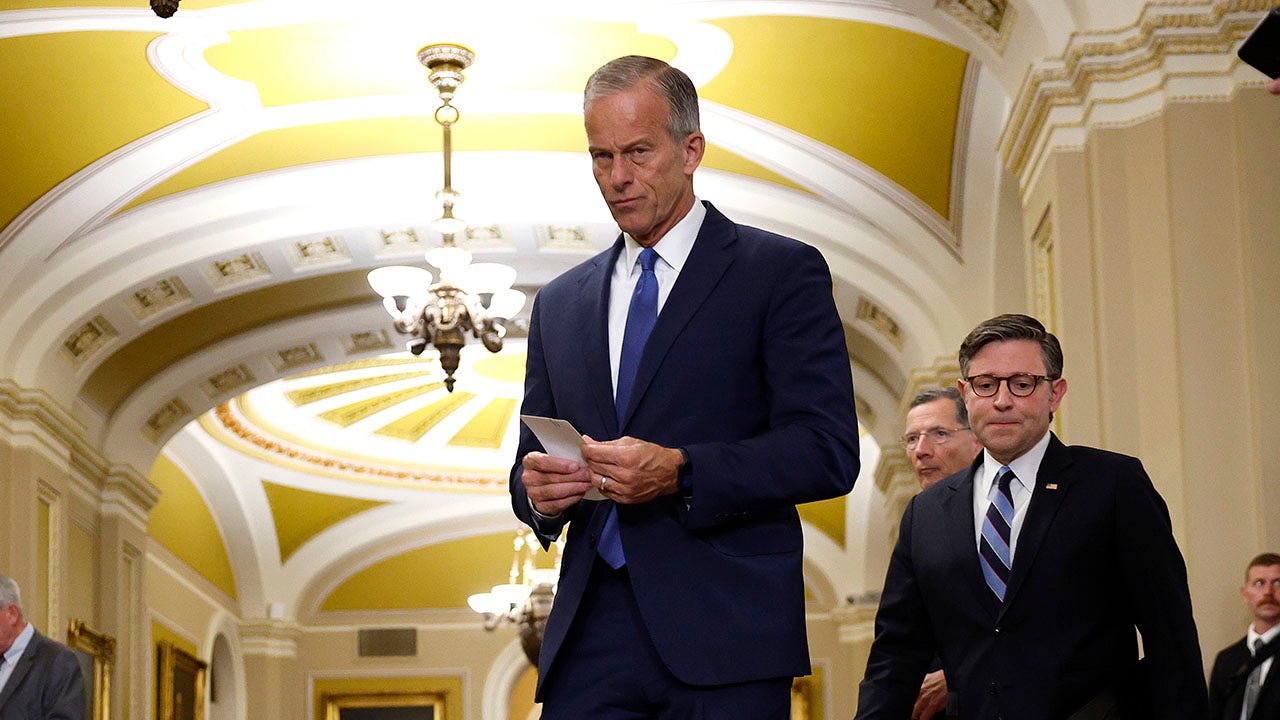Breaking: Thune Blasts Democrat ‘Dysfunction’ as Senate Rejects Critical Defense Bill in Shutdown Standoff
In a fiery Senate floor speech that echoed through the halls of Congress, Majority Leader John Thune unleashed a scathing critique of Democratic “dysfunction,” pinning blame for the failure of a vital defense funding bill squarely on his partisan rivals. As the U.S. government shutdown drags into its 17th day, this latest clash has left military families in limbo and heightened fears of broader economic fallout.
The dramatic vote unfolded late Thursday afternoon on October 16, 2025, when the Senate rejected a $852 billion Defense Department appropriations bill by a tally of 50-44—well short of the 60 votes needed to advance. Republicans, led by Thune of South Dakota, had hoped the standalone measure would provide a lifeline for troops, ensuring paychecks and operational funds amid the fiscal impasse. But Democrats, unified in opposition, argued it was a ploy to sideline urgent domestic priorities like health care extensions.
Thune didn’t hold back in his post-vote remarks, labeling the Democratic stance as “pure dysfunction” that prioritizes political games over national security. “Filibustering a defense appropriations bill? That’s not leadership—it’s chaos,” Thune declared, his voice rising as he addressed reporters outside the chamber. He accused the minority party of allowing “far-left” influences to hijack their agenda, forcing servicemembers to bear the brunt of Washington’s gridlock.
This isn’t the first stumble in the shutdown saga. The federal government locked up on October 1 after Congress failed to pass a stopgap funding measure, marking the fourth such crisis in a decade. Tensions boiled over demands from Democrats for permanent extensions of Affordable Care Act subsidies, which Republicans view as non-negotiable add-ons to any deal. The defense bill, which cleared the House Appropriations Committee with strong bipartisan support earlier this year (26-3), was meant to be a safe harbor—a way to protect Pentagon operations without touching the thornier spending fights.
Background context reveals a deeper partisan divide. Republicans control both chambers post-2024 midterms, but the Senate’s filibuster rule demands cross-aisle consensus for most legislation. Thune’s strategy—pushing the defense bill in isolation—was a calculated dare, forcing Democrats to go on record opposing military funding. Only three Democrats broke ranks to vote yes, including Pennsylvania’s John Fetterman, who cited the need to prioritize troop pay despite his party’s broader stance.
Public reactions poured in swiftly, lighting up social media with a mix of outrage and analysis. On X, conservative users rallied behind Thune, with one viral post declaring, “Democrats just voted against paying our troops—unbelievable dysfunction!” Progressive voices countered, pointing to Fetterman’s lone yes vote as evidence of internal Democratic fractures, while others slammed the GOP for bundling shutdown relief with unrelated defense hikes. Military advocacy groups, like the American Legion, issued statements urging swift resolution, warning that prolonged delays could erode troop morale.
Experts weigh in with stark warnings. National security analyst Michael O’Hanlon from the Brookings Institution called the vote “a dangerous precedent,” noting it echoes past shutdowns that cost the economy billions and delayed critical upgrades to fighter jets and cyber defenses. “This isn’t just politics; it’s putting readiness at risk,” O’Hanlon said in a recent interview. On the flip side, Senate Democratic Whip Dick Durbin defended the blockade, insisting, “We’re not blocking defense—we’re blocking a shutdown on our terms. Health care for millions hangs in the balance.”
For everyday Americans, the stakes feel intensely personal. In the government shutdown’s grip, over 2 million federal workers face furloughs or unpaid leave, rippling into local economies from Virginia’s defense hubs to California’s tech corridors. Military families, already stretched thin, now worry about delayed pay that could mean skipped mortgage payments or bare pantries. Politically, this fuels the 2026 midterm narrative, with Republicans framing Democrats as anti-veteran, while Dems paint the GOP as obstructionists beholden to big donors.
User intent here cuts to the core of civic anxiety: Readers searching “government shutdown updates” or “senate defense bill failure” crave clarity on how this mess affects their wallets and security. Managing expectations means delivering verified timelines—expect more votes next week, per Thune’s signals—and practical tips, like checking USA.gov for furlough resources.
As the shutdown wears on, Thune’s blast underscores a Capitol Hill trapped in echo chambers. With no end in sight, the failed defense vote not only starves the Pentagon of funds but amplifies calls for filibuster reform. Lawmakers return Monday, where a breakthrough—or deeper entrenchment—could redefine trust in governance. For now, the blame game rages, leaving the nation to foot the bill.
By Sam Michael
Follow and subscribe to us for real-time push notifications on breaking political news—stay ahead of the curve!
SEO Tags: government shutdown 2025, senate defense bill, John Thune criticism, Democrat filibuster, military funding failure, US congress shutdown, pentagon appropriations, bipartisan gridlock, troop pay delay, national security risks
